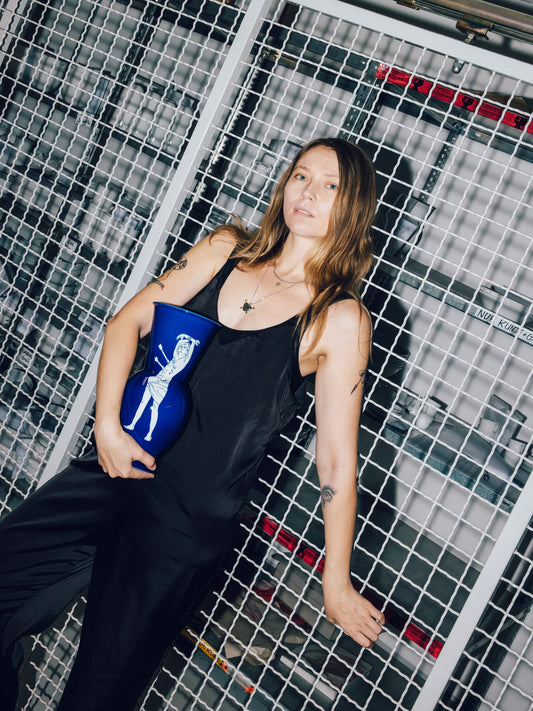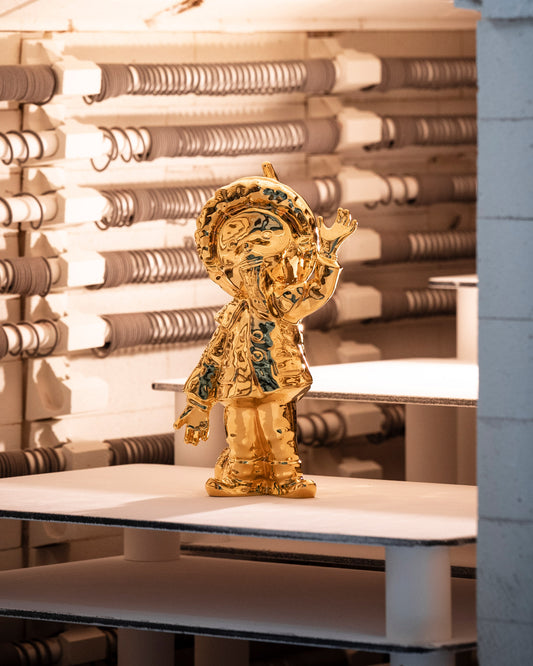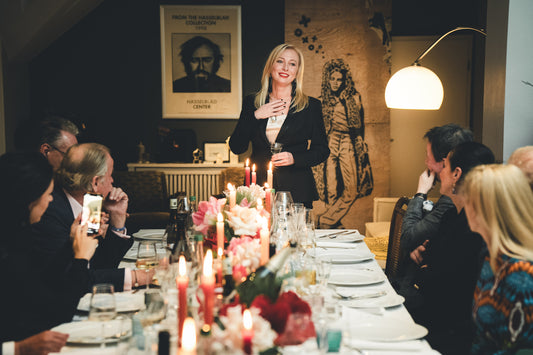WOLTMANN MEETS COUNTESS ROTHKIRCH & GERHARD SCHÖNINGH
For our customer magazine WEISS N°2, Jörg Woltmann - owner of the Königliche Porzellan-Manufaktur - met with Countess Rothkirch and Gerhard Schöningh. Listen once again to an interesting conversation about the ups and downs involved in preserving a cultural asset.
Gerhard Schöningh bought the Hoppegarten racecourse, Jörg Woltmann the Royal Porcelain Manufactory. Both entrepreneurs saved a Berlin cultural asset from bankruptcy - and took on a lot of work. They are supported by the Countess Rothkirch.
Jörg Woltmann: Mr. Schöningh, you flew in from London a few years ago and acquired the Hoppegarten racecourse in Berlin. As an entrepreneur, I naturally found that exciting. We knew that the racecourse was a Berlin gem. But it was also always a neglected child. Why did you invest your private assets?
Gerhard Schöningh: Horse racing has always been a great hobby of mine. I've lived in London for 35 years and regularly went to very good races in England. In 2006, a friend said to me: 'Have you heard that Hoppegarten is being privatized? I only knew the racecourse from a visit in 1989, but of course everyone knows Hoppegarten. It was the number one track in Germany until the end of the Second World War. Since I had enough money and time to spare after selling a company that I had co-founded as a fund manager, I ordered the documents, looked through them and found what I was looking for: This is incredibly exciting. And it would be great to do something completely different. I'm applying.
GERHARD SCHÖNINGH
Born in 1961 in Krefeld, North Rhine-Westphalia, next to a racecourse. At the beginning of the 1980s, Schöningh moved to London, where he worked successfully as a fund manager. In March 2008, he acquired the 207-hectare Hoppegarten site for just under three million euros. euros. This makes Hoppegarten the only racecourse in Europe that is completely privately owned.
Jörg Woltmann: I found this decision impressive. And the Countess Rothkirch, as chairwoman of the Hoppegarten racing club, later brought us together over dinner.
Countess Rothkirch: Yes, I still remember how we were sitting outside in a restaurant in the summer and you, Mr. Woltmann, said to Mr. Schöningh: "We are the two crazy people here in Berlin. crazy people here in Berlin.
Gerhard Schöningh: We could certainly use our time and energy much more profitably.
Jörg Woltmann: Yes, but not more beautiful!
Gerhard Schöningh: Although it is a lot of work. I originally thought you would revive the races and make the buildings more beautiful. But we've been a monument of national importance since 2013. It has just been announced that we will receive half of the eight and a half million euros from the German Bundestag for a monument protection project. will receive. We are now seeking funding from the federal government and the state of Brandenburg. This is a very complex task. I would also like to develop the peripheral areas of the racecourse. Build accommodation there. We will establish businesses and also try to use the huge site for guest events. There is a lot to do.
Jörg Woltmann: I can tell you a thing or two about that. You buy a company and don't even know what to expect. I bought the manufactory within a week without even having been there. Decisions had to be made quickly. There are many unexpected things that come high later.
Gerhard Schöningh: Definitely. In the beginning, I was perhaps a little naive and certainly made a lot of mistakes, but I learned from them. In the meantime, however I now have a very clear picture of how we can lead the plant into a very good future. I didn't have that ten years ago. But I think the opportunities we have are greater than we thought. And very positive overall.
Jörg Woltmann: I think so too. After our dinner, I joined your racing club straight away.
Countess Rothkirch: You were one of our first members. We started out very small. Today, 130 members come to the races. With the racing club, which has the best building with the best view of the racecourse, we want to make racing known in the region, to companies, to Berlin society. We acquire new racehorse owners and bring them together with breeders from all over Germany.
TINI COUNTESS ROTHKIRCH
Born in 1954 in Fritzlar, Hesse. After an apprenticeship as a carpenter in Kassel, she worked as a trainee in an advertising and PR agency while studying at the Advertising Academy in Cologne. She then became the youngest PR manager in Germany at the age of 24 at the InterContinental Hotel in Berlin. For a few years now, she has been giving the racecourse in East Berlin a new lease of life as chairwoman of the racing club.
Jörg Woltmann: And they are preserving a cultural asset, a Berlin institution. I think you have to support that. You have to show your presence. Like you did yesterday at the summer party of my 'Stiftung Royal Porcelain Manufactory Berlin', which is responsible for promoting and developing the cultural heritage of KPM Berlin.
Gerhard Schöningh: I am very pleased that I was able to bid for an URBINO tea service at your party. I find the KPM brand very exciting and I like the fact that you, Mr. Woltmann, have found leading representatives who present the company wonderfully. Just like your head of painting.
Jörg Woltmann: Matthias Dotschko.
Gerhard Schöningh: Yes, he is going to paint my tea service. I've already met him briefly: a very young man who is very polite and very creative. Simply a good guy. It's very important that the employees who embody a company with this tradition - and somehow also rigor - are not just some old fogies and traditionalists. Old brands have to live on, they have to be relevant for people today. You also do a lot of collaborations, even unconventional ones. With Birkenstock, for example. You have to come up with that first.
Countess Rothkirch: How do you have the dishes painted?
Gerhard Schöningh: I don't know yet. I've already been inundated with advice from the guests at the foundation celebration: 'It has to have initials on it, it has to have horses on it'. In any case, I'm really looking forward to choosing the colors and motif with Mr. Dotschko. I'll just ask him. He's a total authority.
Countess Rothkirch: Is it actually difficult to find good new talent for the manufactory?
Jörg Woltmann: Not at all. For us, our profession is a vocation. And our employees can learn in one of the best manufactories in the world. I am very proud that we are now perceived as such and that we have partnerships with great companies such as Bugatti and Bottega Veneta. They don't do this because we are nice people, but because they expect us to have the highest level of expertise and radiance in porcelain.
JÖRG WOLTMANN
Born in Berlin in 1947. After leaving school, he completed an apprenticeship as a banker and studied business administration in Berlin. In 1979, Woltmann founded the private bank ABK Allgemeine Beamten Bank. In February 2006, he became the sole shareholder of
Royal Porcelain Manufactory Berlin. Woltmann holds the Federal Cross of Merit with Ribbon and was awarded the Order of Merit of the State of Berlin in 2015.
Text: Sandra Winkler
Pictures: Anna Rose


